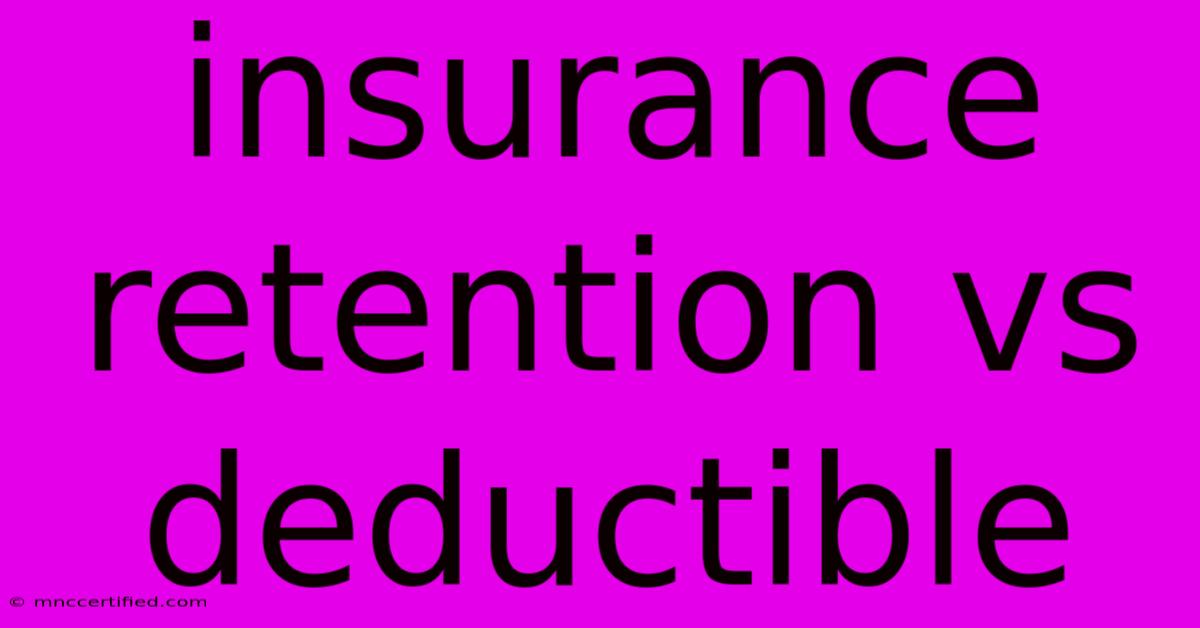Insurance Retention Vs Deductible

Table of Contents
Insurance Retention vs. Deductible: Understanding the Key Differences
Choosing the right insurance policy can feel overwhelming. Two terms frequently cause confusion: insurance retention and deductible. While related, they represent distinct aspects of your insurance coverage. Understanding the difference is crucial for making informed decisions about your insurance plan and minimizing out-of-pocket expenses. This article will clarify the nuances between insurance retention and deductible, empowering you to choose the coverage that best suits your needs.
What is Insurance Retention?
Insurance retention, also known as self-insurance, refers to the amount of risk you, the policyholder, are willing to bear before your insurance coverage kicks in. It's essentially the portion of a loss you agree to absorb yourself. A higher retention means a lower premium, but also a greater financial burden if a claim arises. Think of it as your "skin in the game."
Types of Retention:
- Individual Retention: This is the most common type, where you personally absorb the cost of smaller claims.
- Group Retention: Larger organizations might pool their risk, creating a collective retention fund to handle losses. This is frequently used by businesses with multiple locations or a large employee base.
- Planned Retention: This involves proactively setting aside funds to cover potential losses, minimizing the impact of a claim.
Choosing your retention level significantly impacts your premium. A higher retention translates to lower premiums because the insurance company is taking on less risk. However, it also means you'll pay more out-of-pocket if you need to file a claim. Consider your financial capacity and risk tolerance when determining your comfortable retention level.
What is a Deductible?
A deductible is the amount you pay out-of-pocket before your insurance coverage begins to pay for covered losses. Unlike retention, which is a broader concept encompassing the overall risk you bear, the deductible applies specifically to each individual claim.
Understanding Deductible Implications:
- Higher Deductible = Lower Premium: Similar to retention, a higher deductible typically results in a lower premium. This is because the insurance company's financial responsibility is reduced.
- Lower Deductible = Higher Premium: Conversely, a lower deductible means a higher premium as the insurance company assumes more of the risk.
- Per-Incident vs. Per-Year Deductibles: Some policies have separate deductibles for each incident (e.g., a car accident) and an annual deductible.
The deductible is a crucial factor to consider when evaluating your insurance costs. While a higher deductible might save you money upfront, it means you'll face a larger upfront expense if you need to file a claim.
Retention vs. Deductible: Key Differences Summarized
| Feature | Insurance Retention | Deductible |
|---|---|---|
| Definition | Amount of risk you bear before insurance pays | Amount you pay before insurance covers losses |
| Scope | Overall risk you assume | Applies to each individual claim |
| Premium Impact | Higher retention = lower premium | Higher deductible = lower premium |
| Claim Impact | Affects your out-of-pocket costs for all claims | Affects your out-of-pocket costs for a specific claim |
| Application | Broader concept, applicable to various insurance types | Specific to each claim within a policy |
Choosing the Right Balance: Retention and Deductible Strategies
Finding the optimal balance between retention and your deductible requires careful consideration of your financial situation, risk tolerance, and the type of insurance.
Factors to consider:
- Financial Stability: Can you comfortably absorb a significant out-of-pocket expense if a claim arises?
- Risk Tolerance: Are you comfortable taking on more risk to save money on premiums?
- Claim History: Do you have a history of frequent claims?
- Type of Insurance: Different insurance types (auto, health, home) may have varying implications for deductibles and retention.
Consult an Insurance Professional: Talking to an insurance broker or advisor can help you determine the best retention and deductible levels for your specific circumstances. They can guide you through various policy options, helping you find the right balance between cost and coverage.
By understanding the difference between insurance retention and deductible, you can make informed decisions about your insurance coverage, safeguarding your financial future while optimizing your premiums. Remember that effective insurance planning involves understanding not just the cost, but also the protection it offers.

Thank you for visiting our website wich cover about Insurance Retention Vs Deductible. We hope the information provided has been useful to you. Feel free to contact us if you have any questions or need further assistance. See you next time and dont miss to bookmark.
Featured Posts
-
Russia Threatens Response To Us Missiles
Nov 19, 2024
-
Jolie Pitts Red Carpet Appearance 2024
Nov 19, 2024
-
Wagatha Christie Coleen Rooneys Free Story
Nov 19, 2024
-
Northwest England Met Office Snow Ice Alert
Nov 19, 2024
-
Robby Burress Insurance Oneida Tn
Nov 19, 2024